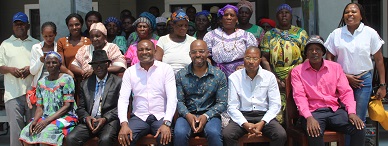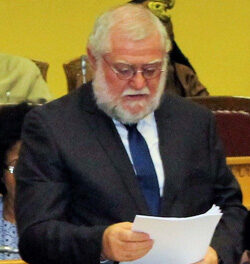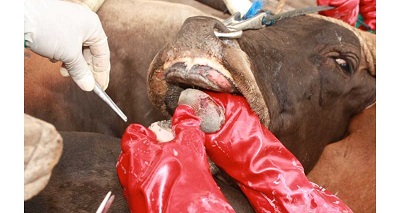
Agribank Investment grows amidst the drought
 Chief Executive Officer of Agribank, Ambassador Leonard Iipumbu, said earlier this month, “The bank once again urges farmers to honour their loan obligations to Agribank to strengthen the financial position of the bank in order to continue investing into the industry for expansion, job creation and economic growth.
Chief Executive Officer of Agribank, Ambassador Leonard Iipumbu, said earlier this month, “The bank once again urges farmers to honour their loan obligations to Agribank to strengthen the financial position of the bank in order to continue investing into the industry for expansion, job creation and economic growth.
The bank will continue to monitor and assess the effects of the drought on agriculture and take appropriate action when the need arises.”
The protracted drought significantly affected the agricultural sector and continues to have negative effects on livestock and dry-land crop production. Agribank introduced the drought relief measures with provision of N$91 million to assist farmers avert the effects of the drought. To date, N$10,5 million has been approved for mostly water infrastructure and production loans bearing an interest rate of 2% for communal and 4% for commercial farmers. The low response to the scheme is as a result of the clients being cautious of falling knee-deep in debts, in conjunction with the bank’s collateral requirements.
The drought-relief measures ended on 31 March 2014, it being regrettable that farmers, especially those in arrears, never taking full advantage of these measures, i.e. the ring-fencing of arrears, holiday payments, production loans and water infrastructure development. In this case, the bank has no alternative but to start implementing its Arrear Recovery Strategy against its clients.
A great number of livestock were marketed during the period from August to December 2013, resulting in low inventory levels experienced in January to March this year. As a result, Agribank’s performance during the same period is remarkable, increasing by 37% to N$84,4 million over the same period in 2013.
This increase was mostly attributed to an increase in the demand for production loans (151%), farm vehicle loans (1,059%), implements loans (306%) and improvement loans (158%). The livestock loans, which traditionally are always in high demand, decreased by 16% when compared to the same period last year.
A total number of 233 Namibians benefited from this investment, creating or maintaining 699 permanent and 1,398 temporary jobs, directly sustaining 3,355 people in the long term, and 6,710 people in the short term. With the low inventory of livestock and the sporadic rainfall, Agribank expects recovery of the agriculture industry to be painstakingly slow, further exacerbated by the high input costs and the weak recovery witnessed in the Euro markets.
The commercial market segment accounted for a significant 65% of the loans granted, the small-scale farmers segment in communal areas accounted for 20%; the AALS market 11%, and the post-settlement farmers 4%.
The farmland-loan product increased by 87% to N$31million from N$16,6 million during the same period of last year and is the product most in demand, with 37% of the total loans approved.
Of the total of five farms purchased during the period under review, only one farm was acquired under the AALS (Affirmative Action Loan Scheme) for N$9,9 million.












































